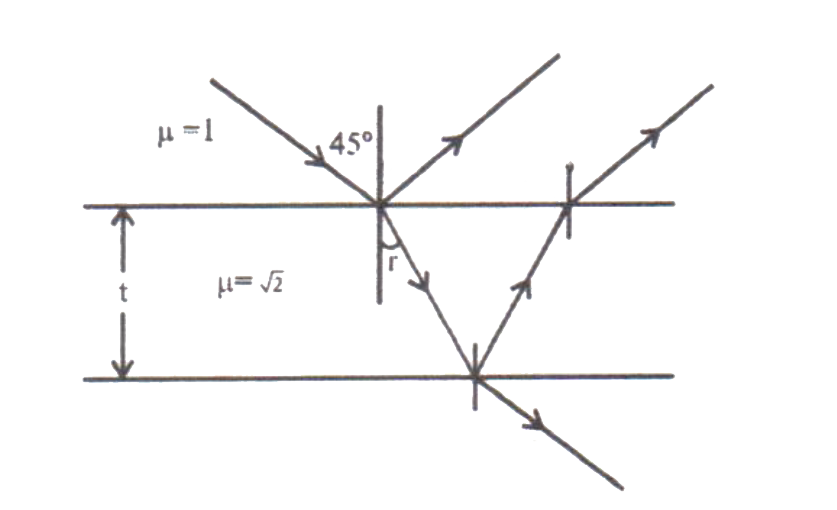A light of wavelength 5890Å falls normally on a thin air film. The minimum thickness of the film such that the film appears dark in reflected light is
(a) 2.945×10−7m
(b) 3.945×10−7m
(c) 4.95×10−7m
(d) 1.945×10−7m
The correct Answer is:A
If thin film appears dark
2μtcosr=nλ for normal incidence r=0∘
⇒2μt=nλ⇒t=nλ2μ
⇒tmin=λ2μ=5890×10−102×1
=2.945×10−7m.
Topper's Solved these Questions
- WAVE OPTICSBOOK - A2ZCHAPTER - WAVE OPTICSEXERCISE - Section B - Assertion Reasoning
23 Videos
- WAVE OPTICSBOOK - A2ZCHAPTER - WAVE OPTICSEXERCISE - AIPMT/NEET Questions
22 Videos
- WAVE OPTICSBOOK - A2ZCHAPTER - WAVE OPTICSEXERCISE - Polarisation Of Light
37 Videos
- SOURCE AND EFFECT OF MAGNETIC FIELDBOOK - A2ZCHAPTER - SOURCE AND EFFECT OF MAGNETIC FIELDEXERCISE - Section D - Chapter End Test
30 Videos
Similar Questions
Knowledge Check
A light of wavelength 5890Å falls normally on a thin air film. The minimum thickness of the film such that the film appears dark in reflected light is
A2.945×10−7mB3.945×10−7mC4.95×10−7mD1.945×10−7mA ray of light is incident at an angle of 45∘ (ralative to the normal) on a thin film of a liquid with an index of refraction of √2. Assuming that the medium of both sides of the film is air, find the minimum thickness of the film required for constructive interference in the reflected light for sodium light of wavelenght 600 nm.
 A122 nmB212 nmC173 nmD320 nm
A122 nmB212 nmC173 nmD320 nmA thin film of a specific meterial can be used to decrease the intensity of reflected light. There is destrucive inteference of wave reflected from upper and lower surface of the film. These films are called non-reflecting or anti-reflecting coatings. The process of coating the lens or surface with non-reflecting film is called blooming as shown in figure The refracting index of coating (n1) is less than that of the glass (n2).

4. If a light of wavelength λ is incident normally and the thickness of film is t, then optical path difference between waves reflected from upper and lower surface of the film isA2n1tB2n1t−λ2C2n1t+λ2D2 t
A parallel beam of light of wavelenght 560nm falls on a film of oil (refractive index =1.4). What should be the minimum thickness of the film so that it weakly transmits the light ?
View SolutionIf the wavelength of incident light on a soap film is 700 nm then its minimum thickness 10 t nm so that constructive interference in reflected light can be observed. The value of t is ………..[Take refractive index of the film as 43]
View SolutionWhite light is incident normally on a plane parallel thin film of µ=1.5. Find the minimum thickness of the film for which light of λ=4000 Å is absent from the reflected light
View SolutionRefractive index of a thin soap film of a uniform thickness is 1.38. The smallest thickness of the film that gives an interference maxima in the reflected light when light of wavelength 5520 Å falls at normal incidence is
View SolutionA certain region of a soap bubble reflects red light of vacuum wavelength λ=650nm. What is the minimum thickness that this region of the soap bubble could be have? Take the index of reflection of the soap film to be 1.41.
View Solution
